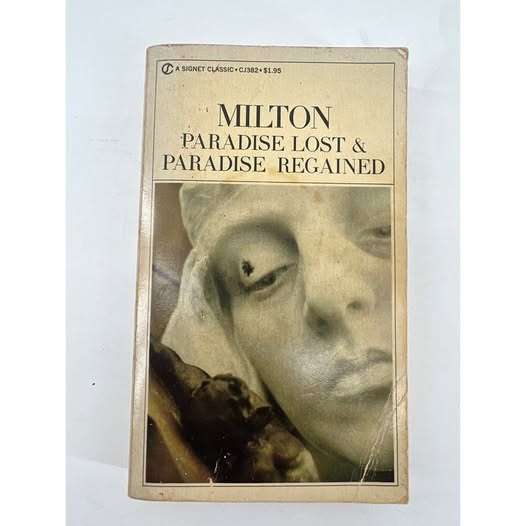Step into a celestial battlefield where the fate of humanity hangs in the balance in Paradise Lost. This epic poem immerses you in the cataclysmic aftermath of Satan’s rebellion against God, once the radiant Lucifer, now a fallen angel consumed by pride. Hurl’d headlong from Heaven with his legion of rebel angels, Satan awakens in the fiery depths of Hell, his defiance unquenched. Driven by envy of God’s newest creation—Adam and Eve, who dwell in the unspoiled Eden—Satan devises a sinister scheme to corrupt them. He traverses the abyss of Chaos, slithers into the Garden as a serpent, and with cunning persuasion tempts Eve to eat from the forbidden Tree of Knowledge, promising her divine insight. Adam, unable to bear separation from Eve, joins her in disobedience, and their act ushers sin, death, and suffering into the world, culminating in their expulsion from Paradise. Milton, a blind Puritan poet writing amidst England’s political upheaval after the Civil War, explores the profound consequences of this fall: the shattering of innocence, the weight of free will, and the tension between divine justice and mercy. Yet amid the tragedy, a glimmer of hope emerges through the promise of a future Redeemer, God’s Son, who will one day restore what was lost. Paradise Lost stands as a towering meditation on the origins of evil, the complexity of human choice, and the divine plan for salvation, its majestic verse—such as Satan’s resolute “Better to reign in Hell than serve in Heaven”—echoing through centuries as a testament to Milton’s vision.
Paradise Regained (1671)
After the sweeping tragedy of humanity’s fall, Paradise Regained offers a focused, redemptive counterpoint, chronicling the pivotal moment of Christ’s victory over evil. This four-book epic centers on the confrontation between Satan and Jesus, the Son of God, during his forty days in the wilderness following his baptism. Satan, having heard God proclaim Jesus as His beloved Son, perceives a threat to his dominion over a fallen world and sets out to corrupt him, just as he did Adam and Eve. Over the course of their encounter, Satan deploys a series of calculated temptations: he appeals to Jesus’ hunger with offers of food, dangles the allure of worldly kingdoms and power, and challenges him with intellectual and theological traps, even urging him to leap from the Temple’s pinnacle to prove his divinity. Jesus, grounded in unwavering faith, humility, and perfect obedience, counters each assault with scriptural wisdom, standing resolute where Adam faltered. His triumph—culminating in Satan’s fall from the Temple—marks not only a personal victory but a cosmic turning point, signaling the dawn of humanity’s path to redemption. Milton, writing in his later years amidst personal hardships, including blindness and political disillusionment following the Restoration, crafts a quieter, more introspective epic than Paradise Lost, emphasizing spiritual fortitude and the true nature of divine kingship. Paradise Regained serves as a profound reflection on the power of faith to overcome temptation, offering a vision of hope and restoration that resonates with the promise of renewal at the heart of Easter, a fitting complement to the sorrowful sacrifice of Good Friday.


